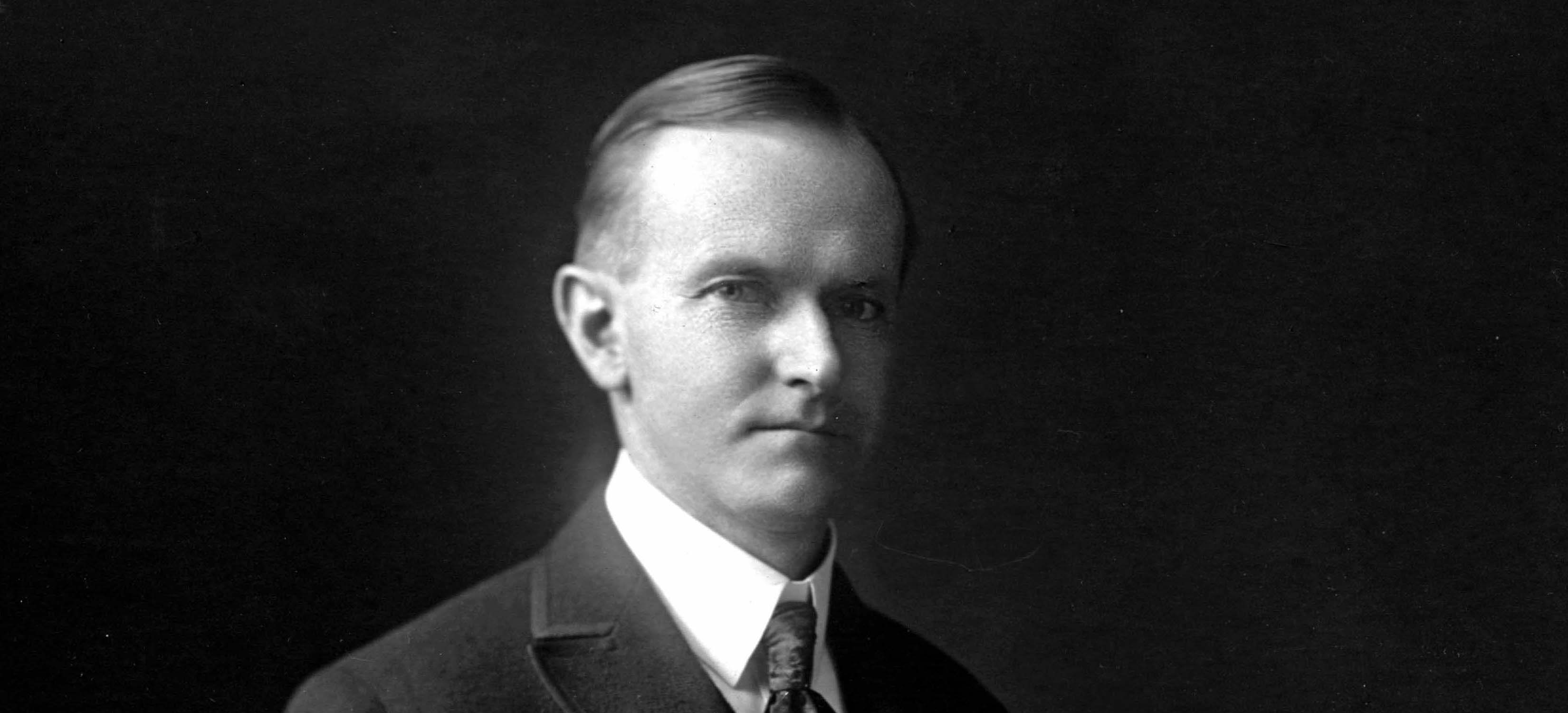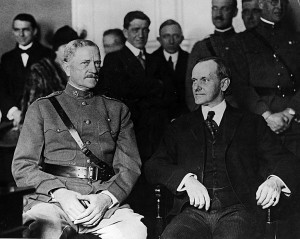
-
Memorial tribute to Calvin Coolidge
Calvin Coolidge died at his home, “The Beeches” in Northampton on January 5, 1933. Upon Coolidge’s death, The Daily Hampshire Gazette published this tribute to Coolidge from Henry P. Field on January 7, 1933. Calvin Coolidge studied law in the Office of Hammond & Field 1895-1897. Henry P. Field, lawyer, Mayor of Northampton, Judge, Forbes Library Trustee, was a great influence in Calvin’s legal and political career.
“This American nation and peoples beyond our borders and across the seas will mourn his departure, but here at home, his home and ours, his death comes as a grievous personal loss. We all knew his fine character, his kindness and consideration for others, his exceptional abilities, his genius for government, his strong common sense, his keen sense of humor. We all knew that he had the courage and perseverance of his Puritan ancestors and their firm and abiding faith. And we also knew how unpretentious he was, how eager to avoid all display. And yet this quiet, unostentatious friend and fellow citizen of ours retired from the Presidency the most highly esteemed and most popular man in all these United States, and in doing so he was passed from this world into a better one. He filled all his man public offices to the entire satisfaction of the people. They trusted him. They felt that in his hands their government was safe. His life has been of infinite value to this country and the nation knows the seriousness of its loss. But to us at home the loss is more intimate. In all the long history of this good city he was its most distinguished citizen, and here in his home town he made life better and finer for every one who came within his influence.”
-
The President Meets the 1925 Senators
By visiting the Coolidge Museum between now and May 2013, you can see President Coolidge’s picture taken on the White House lawn with the 1925 Washington Senators – the baseball team, not the elected officials. The picture is on display to honor a baseball team that is having a great season, the Washington Nationals. They are still in the playoffs as I, a sad citizen of Red Sox Nation, write this blog.
The team photo is part of our new exhibit in the rotating display case titled, ‘…request the honor of your company.’ Famous people are invited to the White House, and we have found pictures of some interesting characters. Some names you will recognize, and some you will not. The concept of everyone having their fifteen minutes of fame is not a new one and certainly applies to a few of the people on display here.
The baseball picture is challenging. One surprise is that the biggest baseball fan in the Coolidge family, the President’s wife, Grace, is not there. You can see her pass to any American League stadium, if you visit the Coolidge Museum.
All of the men in the photo are numbered and their names listed at the side. Unfortunately, only last names are used. The man standing next to Coolidge has both first and last names listed. I had a Dad who was a big baseball fan so I knew right away that ‘Bucky Harris’ sounded familiar.
Harris joined the Senators for the 1919 season as an infielder who mostly played second base. He was inducted into the Baseball Hall of Fame in 1975 as a manager. Here is his bio from the Hall’s website www.baseballhall.org/hof/harris-bucky:
Bucky Harris spent seven different decades in the majors as a player, manager, executive, and scout. The Boy Wonder was 27 when he took over as player-manager of the Washington Senators in 1924, promptly winning two flags in a row. He hit .333 with two home runs to lead the Senators to a World Series title in 1924. Harris also managed the Tigers, the Red Sox and the Phillies, and led the Yankees to a World Championship in 1947. He won 2,159 games in 29 years as a manager.
You may have seen team photos before, but ours is unique in that the players are wearing suits and not uniforms.
Post by Susan Well
-
General Pershing and President Coolidge

Two powerful men of the early twentieth century met and interacted. General of the Armies John Joseph ‘Black Jack’ Pershing, (1860-1948) and President Calvin Coolidge (1872-1933).
Pershing, the most illustrious military man of his times, led the American Expeditionary Forces in World War I. His career began at West Point and continued in a cavalry unit in the West. After law school at the University of Nebraska, he commanded an African-American cavalry regiment in Cuba during the Spanish-American War. Service in the Philippines followed. During World War I: “First, Pershing had to build an army almost from scratch, organizing, training, and supplying an inexperienced force that eventually numbered two million. Then, he had to fight a war on two fronts: one against the Germans, the other against his Allies, who sought to fill their depleted ranks with his fresh troops. But after months of reinforcing the British and French, Pershing’s Army started operating on its own in the summer of 1918, and played a decisive role in defeating the Germans that fall.” (For more information see: General John J. Pershing from PBS’s American Experience).
In circumstances that might have changed history, Pershing’s name was floated for the Republican Presidential nomination in 1920, but did not progress very far as he refused to campaign. In a newspaper Story, he said that he “wouldn’t decline to serve” if the people wanted him. Instead Warren G. Harding was elected President with Calvin Coolidge as his Vice President. Coolidge and Pershing had a meeting in Boston in February 1920 while Coolidge was governor. Between 1921 and 1924, Pershing was Chief of Staff of the United States Army. .
On November 1, 1921, Pershing and Vice President Coolidge were in Kansas City, Missouri at the groundbreaking ceremony for a large World War I monument, the Liberty Memorial. On that day, more than 100,000 people assembled to hear the supreme Allied commanders, who were together for the only times in their lives: General John J. Pershing of the United States Lieutenant General Baron Jacques of Belgium General Armando Diaz of Italy Marshal Ferdinand Foch of France Admiral David Beatty of Great Britain.
Three years later, the Liberty Memorial was completed, and President Calvin Coolidge delivered the dedication speech to an even larger crowd. He said “the magnitude of this memorial, and the broad base of popular support on which it rests, can scarcely fail to excite national wonder and admiration.” The monument’s companion museum was designated by Congress as the National World War I Museum at Liberty Memorial in 2004. For more information on the Liberty Memorial see www.theworldwar.org.
The General appears on a guest list for a White House Garden Party in May 1924. On his 64th birthday in September 1924, Pershing retired from active military service as required by army regulations.Tragedy affected both men’s lives. Pershing’s wife and three daughters had perished in a fire at the Presidio, San Francisco in 1915. His son survived. Many said that the general was never the same after that disaster. In the early summer of 1924, Coolidge’s son, Calvin Coolidge, Jr., age 16 died from blood poisoning from blisters received playing tennis. Some thought the President was never same. Coolidge wrote of his son’s death in his Autobiography that “When he went the power and glory of the Presidency went with him. The ways of Providence are often beyond our understanding…I do not know why such a price was exacted for occupying the White House.” .
Sources:
- The National World War I Museum at Liberty Memorial www.theworldwar.org
- Coolidge, Calvin. The Autobiography of Calvin Coolidge. New York: Cosmopolitan Book Corporation, 1929.
Post researched and written by Calvin Coolidge Presidential Library & Museum Volunteer Susan Well
-
Christmas Day
Christmas represents love and mercy. It was ushered in by the star of hope and remains forever consecrated by the sacrifice of the cross. Christmas holds its place in the hearts of men because they know that love is the greatest thing in the world. Christmas is celebrated in its true spirit only by those who make some sacrifice for the benefit of their fellow men.
Newspaper column, December 25, 1930
-
Thanksgiving
The little band of Pilgrims who first established this institution on the shore by Plymouth Rock had no doubts. If their little colony of devoted souls, when exiled to a foreign wilderness by persecution, cut in half by disease, surrounded by hostility and threatened with famine, could give thanks, how much more should this great nation, less deserving than the Pilgrims yet abounding in freedom, peace, security and plenty, now have the faith to return thanks to the author of all good and perfect gifts.
From “Calvin Coolidge Says”, November 28, 1930.
-
Veteran’s Day
What the veterans gave cannot be measured in money. It was priceless.
From “Calvin Coolidge Says”, January 28, 1931
-
Silent Cal
A wise old owl lived in an oak.
The more he saw the less he spoke.
The less he spoke the more he heard;
Why can’t we be like that old bird?Over the fireplace in Coolidge’s home at Northampton, Massachusetts
-
Past and Future
We review the past not in order that we may return to it but that we find in what direction, straight and clear, it points to the future.
Address as vice president, Burlington, Vermont, June 12, 1923
-
Columbus Day
Measured by its effect on all following history, the voyage of Columbus, ending in the discovery of a new hemisphere, was an achievement of the first magnitude. Possibly others preceded him, but he was the first who made known the existence of America to European civilization.
From “Calvin Coolidge Says”, October 11, 1930
-
Election Day
Elections are the most serious business in which our citizens engage. On their results depends not only the welfare of the people but the demonstration of their ability to govern themselves with safety and justice to each other. The greatest peace-time test of the moral power of a people is the ability to cast a disinterested, unselfish and patriotic vote. At the present time the country needs the most conscientious thought it can give in choosing officers. Only such decision is worthy of a free people.
from “Calvin Coolidge Says”, September 29, 1930

